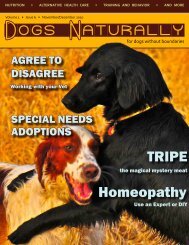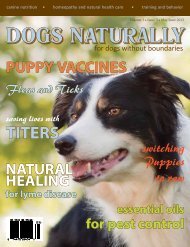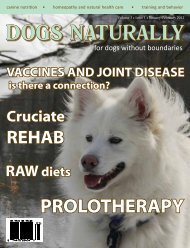July/August 2010 - Dogs Naturally Magazine
July/August 2010 - Dogs Naturally Magazine
July/August 2010 - Dogs Naturally Magazine
Create successful ePaper yourself
Turn your PDF publications into a flip-book with our unique Google optimized e-Paper software.
DN: How did you discover that pets were targeted by<br />
the Pharmaceutical companies?<br />
John Virapen: Although I was primarily involved in this for<br />
children, I had met a homeopath who owned two Yorkshire<br />
Terriers. As I observed her relationship with her dogs, I<br />
understood that people could become as close knit to their<br />
dogs as to their children. The common thread is life; and<br />
Pharma, with the help of the government, is destroying it.<br />
DN: How has pet insurance changed veterinary care?<br />
John Virapen: Expensive new diagnostic and surgical gadgets<br />
are primarily designed to screw the insurance companies.<br />
Vets and doctors are both very well paid to use these<br />
fancy tools and the pet owners pay the price in higher<br />
fees. There are numerous opportunities for Pharma to<br />
corrupt the marketing of animal medicine because nobody<br />
really checks them. These people make a lot of money because<br />
nobody questions them and the animals get the short<br />
end of the stick. Vets can do whatever they want without<br />
fear of malpractice suits because dogs are property and their<br />
value is insufficient to be much of a threat. Last year they<br />
released a new anti-depressant for dogs and this is just<br />
crookery. The pharmaceutical companies have a strong<br />
hold on the veterinary business and they are incapable of<br />
being honest. In the end, the individual vets and their associations<br />
must be the ones to stop the madness.<br />
DN: Why are dogs targeted so heavily?<br />
John Virapen: With all of the debates going on regarding<br />
vaccination primarily, the animals get short changed because<br />
government makes people believe it is for granted<br />
that if we, as humans, get vaccinations then animals should<br />
as well. They depict dogs and cats as nasty carriers of<br />
bugs. This is why in North America, dogs aren’t allowed in<br />
markets, stores or restaurants. It is discrimination<br />
really. The bottom line is money and the Pharmaceutical<br />
companies are fleecing people of their money. Pet owners<br />
must purchase licenses which should give them rights but<br />
does the opposite because we all no that dogs have no<br />
Interview with Dr. John Virapen<br />
Pharmaceutical insider Dr. John Virapen has worked more than 35 years in the pharmaceutical<br />
industry. In Sweden he was general manager of Eli Lilly & Company and was<br />
involved in the market launch of several drugs, all with massive side effects.<br />
John Virapen published his first book under the pseudonym “John Rengen in<br />
2006. “Rubio Talks – A Story From A Pharma-Insider” is about his activity as a manager<br />
in the pharmaceutical industry. In 2008 his new book “Side Effects: Death” was published<br />
and is currently a best-seller in Europe.<br />
John Virapen is now dedicated to expose and create awareness on how the pharmaceutical<br />
industry is operating with their own best interest as their primary goal.<br />
John’s website is http://www.john-virapen.com<br />
rights. Pretty soon we will need to get permission to deal<br />
with our kids too. In Leipzig, there is a push for mandatory<br />
psychiatric evaluation of infants and soon, mothers will lose<br />
control of their children.<br />
DN: Why are animal vaccinations more problematic<br />
than human vaccinations?<br />
John Virapen: The pharmaceutical companies use vaccinations<br />
and drugs they can’t dispense for humans on<br />
dogs. This includes expired lots as well as products not<br />
approved for human use. They then use fear mongering to<br />
market it.<br />
I recruited the General Manager of animal product in Scandinavia<br />
and we had frequent conversations. He warned me<br />
of the many issues with the animal products. For example,<br />
while the company was still trying to get approval for Human<br />
Growth Hormone for animals, they were already injecting<br />
it into pigs and cows. They didn’t care that the<br />
HGH was contaminated: they were mostly waste from the<br />
human market although humans would be consuming these<br />
animals in the end.<br />
DN: How are these products marketed?<br />
John Virapen: The media now works so closely with<br />
Pharma that it is called seeding. For example the press<br />
might claim that women with big bums are protected from<br />
diabetes. Soon thereafter, the media will feature a doctor<br />
talking about these findings then a few months later the<br />
press will announce “we are close to a breakthrough for<br />
diabetes”. This build up is meticulously designed to scare<br />
people because Pharma knows that people still run to their<br />
doctor when the government or media reports any new<br />
virus or disease.<br />
Marketing strategies are planned years ahead. If a new<br />
product is on the way, the Pharmaceutical companies will<br />
do the market research first and based on that, lay down<br />
strategies in terms of time and method. This is normally<br />
done with a five year projection before launch. Their ploys<br />
<strong>Dogs</strong>...<strong>Naturally</strong>! <strong>July</strong>/<strong>August</strong> <strong>2010</strong>












